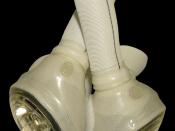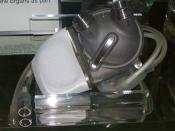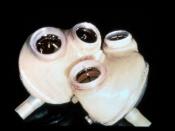In its never ending pursuit of advancement, science has reached a crucial biotechnological plateau, the creation of artificial organs. Such a concept may seem easy to comprehend until one considers the vast knowledge required to provide a functional substitute for one of nature's creations. One then realizes the true immensity of this breakthrough. Since ancient times, humans have viewed the heart as more than just a physical part of the body. It has been thought the seat of the soul, the source of emotion, and the center of each individual's existence. For many years, doctors and researchers left the heart untouched because they thought it was too delicate, too crucial to withstand the rigors of surgery. However, the innate human desire to achieve brought about the invention of the artificial heart. The potential for such inventions are enormous. According to the American Heart Association, there are between 16,000 and 40,000 possible recipients of artificial heart devices under the age of sixty-five.
If perfected, it would enable us to save thousands of human lives.
In considering the full impact of artificial heart devices on society, we must not narrow our thinking to include only the beneficial possibilities. There exist moral, ethical, and economic factors that accompany these new innovations to humanity. Who will receive these brilliant inventions? Obviously not all of the patients will get transplants, so selection criteria must be established. The high price of artificial heart devices and their implantation will eliminate some candidates. Unfortunately, this is not fair. The rich, in essence, can buy life, whereas the poor are abandoned to die in a diseased state. A thorough analysis of the implications of the implantation of such devices reveals not only selection and economic consideration, but mortality and ethics as well. Many contest that it is simply...


